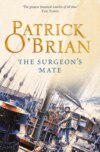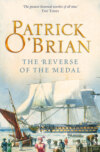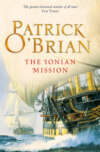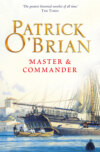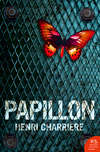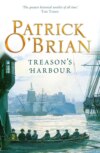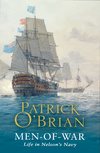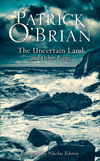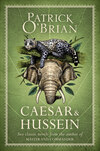Читать книгу: «The Surgeon’s Mate»
PATRICK O’BRIAN
The Surgeon’s Mate

Copyright
This novel is entirely a work of fiction. The names, characters and incidents portrayed in it are the work of the author's imagination. Any resemblance to actual persons, living or dead, events or localities is entirely coincidental.
HarperCollinsPublishers Ltd. 1 London Bridge Street London SE1 9GF
Copyright © Patrick O’Brian 1980
Patrick O’Brian asserts the moral right to be identified as the author of this work
A catalogue record for this book is available from the British Library
All rights reserved under International and Pan-American Copyright Conventions. By payment of the required fees, you have been granted the non-exclusive, non-transferable right to access and read the text of this ebook on-screen. No part of this text may be reproduced, transmitted, down-loaded, decompiled, reverse engineered, or stored in or introduced into any information storage and retrieval system, in any form or by any means, whether electronic or mechanical, now known or hereinafter invented, without the express written permission of HarperCollins ebooks
HarperCollinsPublishers has made every reasonable effort to ensure that any picture content and written content in this ebook has been included or removed in accordance with the contractual and technological constraints in operation at the time of publication
Source ISBN: 9780006499213
Ebook Edition © DECEMBER 2011 ISBN: 9780007429332
Version: 2019-03-28
MARIAE SACRUM
Contents
Title Page
Diagram of a Square-Rigged Ship
Author’s Note
Chapter One
Chapter Two
Chapter Three
Chapter Four
Chapter Five
Chapter Six
Chapter Seven
Chapter Eight
Chapter Nine
Chapter Ten
Chapter Eleven
The Jack Aubrey Novels: an editorial report – RICHARD OLLARD
Keep Reading
About the Author
The Works of Patrick O’Brian
Copyright
About the Publisher
The sails of a square-rigged ship, hung out to dry in a calm.

1 Flying jib
2 Jib
3 Fore topmast staysail
4 Fore staysail
5 Foresail, or course
6 Fore topsail
7 Fore topgallant
8 Mainstaysail
9 Main topmast staysail
10 Middle staysail
11 Main topgallant staysail
12 Mainsail, or course
13 Maintopsail
14 Main topgallant
15 Mizzen staysail
16 Mizzen topmast staysail
17 Mizzen topgallant staysail
18 Mizzen sail
19 Spanker
20 Mizzen topsail
21 Mizzen topgallant
Illustration source: Serres, Liber Nauticus.
Courtesy of The Science and Technology Research Center, The New York Public Library, Astor, Lenox, and Tilden Foundation
Author’s Note
Great men can afford anachronism, and indeed it is rather agreeable to find Criseyde reading the lives of the saints or Hamlet going to school at Wittenberg; but perhaps the ordinary writer should not take many liberties with the past. If he does, he sacrifices both authenticity and the willing suspension of disbelief, and he is sure to receive letters from those with a greater love of precision than himself. Only the other day a learned Dutchman reproached me for having sprinkled eau de Cologne in the forepeak of HMS Shannon in my last book: the earliest English reference to eau de Cologne, said he, quoting the Oxford Dictionary, is in a letter of Byron’s dated 1830. I believe he was mistaken in assuming that no Englishman ever spoke of eau de Cologne before that time; but his letter made me uneasy in my mind, all the more so since in this present book I have deliberately kept Sir James Saumarez in the Baltic some months after he had taken the Victory home and struck his flag. In the first draft I had relied on the Dictionary of National Biography, which maintained the Admiral in command for my chosen period: but then, checking in the memoirs of one of his subordinates, I found that in fact another man had taken his place. Yet I did want to say something about Saumarez, an outstanding example of a particular type of sea-officer of that time, deeply religious, extremely capable, and a most effective diplomat, so as I really could not rearrange the calendar any more I decided to leave things as they were, although out of some obscure feeling of respect for that noble ship I omitted all reference to the Victory. The historical sequence, therefore, is not quite exact; but I trust that the candid reader will grant me this amount of licence.
Chapter One
The long harbour of Halifax in Nova Scotia on a long, long summer’s day, and two frigates gliding in on the tide of flood under their topsails alone: the first, since she had belonged to the United States Navy until a few days before, wore the Stars and Stripes under a white ensign; the second showed no more than her own shabby colours, for she was HMS Shannon, the winner in that short and bloody action with the Chesapeake.
The Shannon’s crew already had some notion of the welcome they should receive, because news of the victory had spread and dories, yachts, privateers’ boats and small craft of all kinds had met them beyond the distant harbour’s mouth, sailing along with them, waving their hats and bawling out ‘Bravo – huzzay – well done, Shannon – huzzay, huzzay!’ The Shannons took no great notice of the civilians, apart from a distant acknowledgement, a discreet wave from the watch below; but the small craft took great notice of them, and although the casual observer saw little to exclaim at in the Shannon herself, with most of her rigging new set up, a fresh suit of sails bent to her yards, and her paintwork at least as trim as it was when she set out from this same port some weeks ago, the more knowing eye of the privateersmen saw the deep wounds in her bowsprit and her masts, the mizzen fished with capstan-bars, the shot still lodged in her side and the plugs where they had gone through: yet even the most unobservant could not miss the gaping void in the Chesapeake’s stern and larboard quarter, where the Shannon’s full starboard broadside had raked her again and again, sending some five hundredweight of iron hurtling clean through her length at every blast. They did not of course see the blood of that savage conflict, the blood that had poured thick from the scuppers, for the Shannons had cleaned both ships and they had priddied the decks as far as they could; but even so, from the state of the masts and the yards and of the Chesapeake’s hull, any man who had seen action could imagine the slaughter-house look of the ships when the battle ended.
The Shannons, then, knew how they would be received, and the watch below had already contrived to slip into their best shore-going rig of glazed broad-brimmed hats with Shannon embroidered on the ribbon, bright blue jackets with brass buttons, loose white trousers with ribbons in the seams, and very small shining black pumps; but even so they were astonished by the prodigious volume of sound that met them as they neared the wharves – by the overlapping waves of cheers and then by the even louder, even more highly-valued, exactly-ordered cheering as they passed the men-of-war that lay in the harbour, each one with her yards and rigging manned all over, roaring in unison ‘Shannon, huzzay, huzzay, huzzay!’ so as to make the air and the sea under it tremble while the frigate slipped along on the height of the tide to pick up her familiar moorings. The whole of Halifax had turned out to greet them and their victory, the first victory in a war that had started so disastrously for the Royal Navy, with three proud frigates taken one after another by the Americans in single-ship actions, to say nothing of the smaller vessels: obviously the sailors were the most ecstatic – and their bitter pain at all these defeats could be measured by the hoarse enormity of their present joy – but the thousands and thousands of redcoats and civilians were delighted too, and young Mr Wallis, in command of the Shannon, could scarcely be heard when he gave the order to clew up.
Yet although the Shannons were pleased and astonished, they remained for the most part grave, gravely pleased: their deeply-respected captain lay between life and death in his cabin; they had buried their first lieutenant and twenty-two of their shipmates; and the sickbay, overflowing into the berth-deck, held fifty-nine wounded, many of them very near their end and some of them the most popular men in the ship.
When the port-admiral came up the side, therefore, he saw a sparse crew, togged to the nines but with a restraint upon them, and a thinly-peopled quarterdeck – few officers to greet him. ‘Well done, by God,’ he cried above the wail of bosun’s calls piping him aboard, ‘well done, the Shannon.’ And then, ‘Where is Captain Broke?’
‘Below, sir,’ said Mr Wallis. ‘Wounded, I regret to say. Very badly wounded in the head. He is barely conscious.’
‘Oh, I am sorry for that. Damme, I am sorry for that. Is he very bad? The head, you say? Are his intellects in trim – does he know about his famous victory?’
‘Yes, sir, he does. I believe that is what keeps him going.’
‘What does the surgeon say? Can he be seen?’
‘They would not let me in this morning, sir, but I will send below and ask how he does.’
‘Aye, do,’ said the Admiral. A pause. ‘Where is Mr Watt?’ – referring to the first lieutenant, once a midshipman of his.
‘Dead, sir,’ said Wallis.
‘Dead,’ said the Admiral, looking down. ‘I am most heartily sorry for it – a fine seamanlike officer. Did you suffer a great deal, Mr Falkiner?’
‘We lost twenty-three killed and fifty-nine wounded, sir, a quarter of our people: but Chesapeake had above sixty killed and ninety wounded. Her captain died aboard us on Wednesday. May I say, sir,’ he added in a low voice, ‘that my name is Wallis? Mr Falkiner is in command of the prize.’
‘Just so, just so,’ said the Admiral. ‘A bloody business, Mr Wallis, a cruel business: but worth it. Yes, by God, it was worth it.’ His eye ran along the clean, orderly, though scarred deck, the boats, two of them already repaired, up to the rigging, and lingered for a moment on the fished mizzen. ‘So you and Falkiner and what hands you had left brought them both in between you. You have done very well indeed, Mr Wallis, you and your shipmates. Now just give me a brief, informal account of the action: you shall put it in writing presently, if Captain Broke don’t recover in time for the dispatch; but for the moment I should like to hear it from your own mouth.’
‘Well, sir,’ began Wallis, and then paused. He could fight extremely well, but he was no orator; the Admiral’s rank oppressed him, so did the presence of an audience that included the only surviving American officer fit to stand – though even he was wounded. He brought out a lame, disjointed tale, but the Admiral listened to it with a glowing, visible delight, for with what he had heard before it fell into perfect shape, even more perfect than the rumours that had already reached him. What Wallis said confirmed all that he had heard: Broke, finding the Chesapeake alone in Boston harbour, had sent his consorts away, challenging her captain to come out and try the issue in the open sea. The Chesapeake had indeed come out in the most handsome, gallant manner: they had fought their battle fair and square, evenly matched, broadside to broadside, with no manoeuvring; and having swept the Chesapeake’s quarterdeck clear, killing or wounding almost all her officers in the first few moments, the Shannon had raked her, boarded her, and carried her. ‘And it was just fifteen minutes, sir, from the first gun to the last.’
‘Fifteen minutes, by God! That I did not know,’ said the Admiral; and after a few more questions he clapped his hands behind his back and paced up and down, silently digesting his satisfaction.
His eye caught a tall figure in a post-captain’s uniform standing by the Marine officers and he cried, ‘Aubrey! Why, it must be Aubrey, upon my life!’ He stepped forward with his hand outstretched: Captain Aubrey whipped his hat under his left arm, edged his right hand from its sling, and gave the Admiral’s as hearty a shake as he could. ‘I was sure I could not mistake that yellow hair,’ said the Admiral, ‘though it must be years … a wounded arm? I knew you was in Boston, but how come you here?’
‘I escaped, sir,’ said Jack Aubrey. ‘Well done,’ cried the Admiral again. ‘So you were aboard for this noble victory! That was worth an arm or two, by God. Give you joy with all my heart. Lord, how I wish I had been with you. But I am most damnably grieved for poor dear Watt, and for Broke. I must have a word with him, if the surgeon … Is your arm bad?’ – nodding towards the sling.
‘It was only a musket-ball in the Java action, sir. But here are the doctors, sir, if you wish to speak to them.’
‘Mr Fox, how d’ye do?’ said the Admiral, turning to the Shannon’s surgeon, who had just come up the main hatch-way with a companion, both of them in their working clothes. ‘And how is your patient? Is he fit to receive a visit, a short visit?’
‘Well, sir,’ said Mr Fox with a doubtful shaking of his head, ‘we dread any excitement or mental exertion at this stage. Do you not agree, colleague?’
His colleague, a small sallow man in a blood-stained black coat, dirty linen and an ill-fitting wig, said, ‘Of course, of course,’ in a somewhat impatient tone. ‘No visits can possibly be allowed until the draught has had its effect,’ and he was moving away without another word when Captain Aubrey took him by the elbow and said in a private voice, ‘Hold hard, Stephen: this is the Admiral, you know.’
Stephen looked at Aubrey with his strange pale eyes, redrimmed now after days and nights of almost incessant exertion, and said, ‘Listen now, Jack, will you? I have an amputation on my hands, and I would not pause to chat with the Archangel Gabriel himself. I have only stepped up to fetch my small retractor from the cabin. And tell that man not to talk so loud.’ With this he walked off, leaving nervous smiles behind him, anxious looks directed at the Admiral: but the great man did not seem at all put out. He gazed about the ship and over the water at the Chesapeake and his deep delight showed clear beneath his immediate concern for the Shannon’s captain and her missing officers and men. He asked Wallis for the muster-roll of the prisoners of war, and while it was being fetched he stood by an improvised hood over the cabin skylight with Jack Aubrey and said, ‘I know I have seen that face before; but I cannot put a name to it.’
‘He is Dr –’ began Captain Aubrey.
‘Stay. Stay. I have it. Saturnin – that’s the man. Admiral Bowes and I were calling at the palace to enquire after the Duke, and he came out and told us how he did. Saturnin: I knew I should get it.’
‘The very same man, sir. Stephen Maturin was called in to doctor Prince William, and I believe he saved him when all else had failed. A prodigious physician, sir, and my particular friend: we have sailed together since the year two. But I am afraid he is not quite used to the ways of the service yet, and he sometimes gives offence without intending it.’
‘Why, he is no great respecter of persons, to be sure; but I am not at all offended. I don’t take myself for God the Father, you know, Aubrey, although I have my flag; and anyhow, it would take a great deal to put me out of humour on such a day – Lord, Aubrey, such a victory! Besides, he must be a great man in the physical line, to be called in to the Duke. How I wish he may save poor Broke. Your servant, ma’am,’ he cried, gazing with respectful admiration at an extraordinarily elegant young woman who suddenly appeared from the temporary hood, carrying a basin and followed by a weary, blood-spattered surgeon’s assistant. She was pale, but in these surroundings her pallor suited her: it gave her a quite remarkable distinction.
‘Diana,’ said Captain Aubrey, ‘allow me to name Admiral Colpoys: my cousin Mrs Villiers. Mrs Villiers was in Boston, sir, and she escaped with Maturin and me.’
‘Your most humble, devoted, ma’am,’ said the Admiral, bowing. ‘How I envy you, having been in such a brilliant action.’
Diana put down her basin, curtsied, and replied, ‘Oh, sir, I was kept below stairs all the time. But how I wish,’ she said with a fine flash of her eye, ‘how I wish I had been a man, to board with the rest of them.’
‘I am sure you would have struck them dead, ma’am,’ said the Admiral. ‘But now you are here, you must take up your quarters with us. Lady Harriet will be delighted. Here is my barge, at your pleasure, if you choose to go ashore this minute.’
‘You are very good, Admiral,’ said Diana, ‘and I should be most happy to wait on Lady Harriet, but what I am about will keep me some hours yet.’
‘I honour you for it, ma’am,’ said the Admiral, for a glance at the basin showed the nature of her occupation. ‘But the moment you are ready, you must come up to the house. Aubrey, the moment Mrs Villiers is ready, you are to bring her up to the house.’ His beaming smile faded as a high quavering shriek, almost inhuman in its agony, came up from the sickbay, piercing the noise of cheering like a knife: but he had seen a great deal of action – he knew the price there was to pay – and with little less good humour he added, ‘That is an order, Aubrey, d’ye hear me?’ Then, turning to the young lieutenant he said, ‘Now Mr Wallis, let us go to our business.’
The hours had passed: Captain Broke had been carried to the Commissioner’s house and his wounded shipmates to the hospital, where those who were not out of their minds with pain lay peacefully enough by the wounded Chesapeakes, sometimes exchanging quids of tobacco and smuggled rum; the American prisoners of war had been taken out of their ship, the few surviving officers paroled and the men sent to the barracks; and the most wretchedly miserable of all, the British deserters captured in the Chesapeake, had been taken to prison, with no likelihood of leaving it except for a journey to the gallows. At present the cruellest face of war was no longer to be seen: joy and lively anticipation began to overcome thoughtfulness and grief in the frigate as neighbouring captains sent over parties of volunteers, men enough to provide a harbour-watch so that the Shannons might have a run ashore; and the newcomers’ gaiety, combining with the continuing shouts and yells from the wharves, made the younger liberty-men laugh aloud as they stood, treading on one another’s toes on the gangway, while their companions, moving carefully not to get tar on their gleaming ducks, hoisted out the boats.
‘Cousin Diana,’ said Jack Aubrey, ‘should you like to go ashore? I will hail Tenedos for her captain’s gig.’
‘Thank you, Jack,’ said she, ‘but I had rather wait for Stephen. He will not be long.’ She was sitting on a small green brass-studded trunk, the only thing she had brought with her in their hurried flight from Boston, and she was gazing out at Halifax over a shattered nine-pounder gun. Jack stood by her and gazed too, one foot on the carriage; but he gazed with no more than the shallowest surface of his attention, while the rest of his mind floated free. His whole being was suffused with deep happiness, for although this victory was none of his, he was a sea-officer through and through, wholly identified with the Royal Navy from his childhood, and the successive defeats of the last year had weighed upon him so that he had been hardly able to bear it. Now the burden was gone: the two ships had met in equal fight; the Royal Navy had won; the universe was restored to its true foundations; the stars had resumed their natural march; and as soon as he reached England there was every likelihood that he should have a command, the Acasta of forty guns, that would help to make their march more natural still. Then again, as soon as he was ashore he would run to the post for his letters: he had not heard from Sophie, his wife and Diana’s first cousin, all the time he had been a prisoner of war in Boston, and he longed to hear from her, longed to hear how the children did, longed to hear of his horses, the garden, the house … yet beneath all this there was a point, and more than a point, of anxiety. Although he was an unusually rich commander, an officer who had made more prize-money than most captains of his seniority – more indeed than many admirals – he had left his affairs in a highly complicated state, and their unravelling depended upon the honesty of a man whom neither Sophie nor his friend Maturin trusted at all. This man, a Mr Kimber, had promised Jack that the disused lead-mines on his land could be made to produce not only more lead but also a surprising amount of silver by a process known to Mr Kimber alone, thereby yielding a very handsome return indeed upon the initial outlay; yet the last letters that Captain Aubrey had ever received from his wife, far away in the East Indies, before he was captured by the Americans on his return voyage to England, had spoken not of yield, not of profit, but of obscure unauthorized doings on the part of Kimber, of very heavy new investments in roads, mining-equipment, a steam-engine, deep-sunk shafts … He longed to have this clarified; and he was tolerably confident that it would be clarified, for whereas Sophie and Stephen Maturin understood nothing of business, Jack had based his opinion upon solid facts and figures, not mere intuition: in any case, he had a far greater knowledge of the world than either of them. But more than that he longed to hear of his children, his twin daughters and his little son: George would be talking by now, and the want of news had been one of the hardest things to bear during his captivity; for not a single letter had come through. And most of all he wanted to see Sophie’s hand and to hear her voice at one remove: her last letters, dated before the American war, had reached him in Java and he had read them until they cracked at the folds, had read them again and again until they, with almost all his other possessions, had been lost at sea. Since then, no word. From a hundred and ten degrees of east longitude to sixty degrees west, almost half the world, and never a word. It was the sailor’s lot, he knew, with the packets and all other forms of transport so uncertain, but even so he had felt ill-used at times.
Ill-used by fate in general rather than by Sophie. Their marriage, firmly rooted in very deep affection and mutual respect, was far better than most; and although one of its aspects was not altogether satisfactory for a man of Jack Aubrey’s strong animal spirits, and although it might be said that Sophie was somewhat possessive, somewhat given to jealousy, she was nevertheless an integral part of his being. She was no more faultless than he was himself, and indeed there were moments when he found his own faults easier to excuse than hers; but all this was quite forgotten as his inner eye contemplated the parcel of letters that he would find waiting for him over the smooth water there in Halifax.
‘Tell me, Jack,’ said Diana, ‘did Sophie have a hard time of it, with her last baby?’
‘Hey?’ cried Jack, brought back from a great way off. ‘A hard time of it with George? I hope not, by – I hope not, indeed. She did not mention it at all. I was in Mauritius at the time. But I believe it can be very bad.’
‘So they tell me,’ said Diana: and after a pause, ‘Here is Stephen.’
A few minutes later the boat was alongside, and they made their farewells to the Shannon rather than her people, for they would all meet again on shore in the course of the festivities that would follow the victory – the Admiral had already spoken of a ball. Diana refused Wallis’s offer of a bosun’s chair and ran down after Stephen as lithe and nimble as a boy, while the boat’s crew stared woodenly out into the offing, lest they should see her legs; but she did call out to beg that those on deck might take great care of her trunk. ‘It is my all, you know, my little all,’ she said, smiling up into Mr Wallis’s enchanted face.
They made a curious group there in the stern-sheets as the boat pulled for the shore, a group bound together by strong, intricate relationships; for not only had the two men competed for her liking in the past so that it had very nearly broken their friendship, but Diana had been the great love of Stephen’s life, his prime illusion. She had thrown him over in India in favour of an American, a very wealthy man called Johnson, whose company she found increasingly unpleasant on their arrival in the States and, after the declaration of war, quite intolerable. It was when Maturin reached Boston as a prisoner of war that they came together again and that he found that although he still admired her spirit and beauty, it was as though his heart were numb. What changes in her or in himself had brought this about he could not tell for sure; but he did know that unless his heart could feel again the mainspring of his life was gone. However, they had escaped together, reaching the Shannon in a boat; and they were engaged to be married, an engagement that Stephen felt to be her due, if only as a means of recovering her nationality, and one that to his astonishment she seemed to welcome, although up until this time he had thought her the most intuitively perceptive woman of his acquaintance. Indeed, but for the battle they would already have been man and wife by the law of England if not by that of the Catholic church (for Maturin was a Papist), since Philip Broke had been about to exercise his powers as a captain and marry them at sea, and Diana would have been a British subject once more, instead of a paper American.
Yet in spite of these currents of feeling beneath the surface they talked very cheerfully and calmly all the way to the landing-place and up to the Admiral’s house, where they parted like old friends, Jack to report to the Commissioner and then to see about his post and their lodgings, and Stephen to an unnamed destination with a sailcloth parcel under his arm, his only baggage, while Diana remained with the short-legged, good-natured Lady Harriet Colpoys.
Stephen did not name his destination, but if they had reflected neither of his companions would have had much difficulty in guessing it. In the course of their long service together it had necessarily come to Captain Aubrey’s knowledge that although Dr Maturin was certainly an eminent medical man who chose to sail as a ship’s surgeon for the opportunities of making discoveries in natural philosophy (his chief passion, second only to the overthrow of Buonaparte), he was also one of the Admiralty’s most prized intelligence agents; while immediately before their escape Diana had seen him remove the papers that his parcel contained from the rooms that she and Mr Johnson occupied in Boston, explaining his action by the statement that they would interest an intelligence officer he happened to know in Halifax. Stephen was perfectly aware of this, but the long-established habit, the second nature of extreme discretion to which he owed his continuing existence made him non-committal in all circumstances; it also caused him to take a roundabout way to the office of his correspondent, looking in shop windows and taking full advantage of those that showed the street behind him. It was an automatic precaution, but here it was an unusually necessary one, for as he knew better than any man in Halifax there were several American agents in the town; and Johnson’s fury at being robbed of both his mistress and his papers would urge him to make extraordinary efforts in the way of revenge.
However, he reached the office unfollowed, with an easy mind, and sent in his name. Major Beck, the Marine in charge of intelligence on the North American station, received him at once. They had not met before and Beck looked at him with lively curiosity: Dr Maturin had a great reputation in the department as one of the few wholly voluntary agents who were also wholly effective, wholly professional; and although Maturin’s mixed Irish-Catalan parentage meant that he was primarily an expert on Catalan affairs, Beck knew that the Doctor had recently accomplished the feat of decimating the ranks of the French service by means of false, compromising information conveyed to Paris in all good faith by the Americans. Seeing that this concerned his own field, Beck was officially acquainted with it; but he had also heard vaguer, less official accounts of other equally remarkable coups in Spain and France, and he found that he was most illogically disappointed by the meagre, shabby, undistinguished man who sat on the other side of the desk, slowly undoing a sailcloth parcel. Against all reason Beck had expected a more heroic figure: certainly not one who wore blue spectacles against the sun.
Stephen’s reflexions were equally unflattering. He observed that Beck was an obscurely misshapen fellow with watery goggling eyes, spare sandy hair, no chin, a prominent Adam’s apple, and, in spite of an intelligent forehead, the settled look of a man who fitted nowhere. ‘Are we all, always, so distorted?’ he wondered, thinking of some of his other colleagues.
They talked for a while about the victory, Beck speaking with an enthusiasm that brought colour to his unhealthy thin-skinned yellow face and Stephen steadily disclaiming any particular knowledge of the action: he had been below from the first gun to the last: he knew nothing of the evolutions, nor was he able to speak to the number of British deserters serving in the American ship or of the means employed to seduce them. Beck seemed disappointed.
Начислим
+23
Покупайте книги и получайте бонусы в Литрес, Читай-городе и Буквоеде.
Участвовать в бонусной программе
